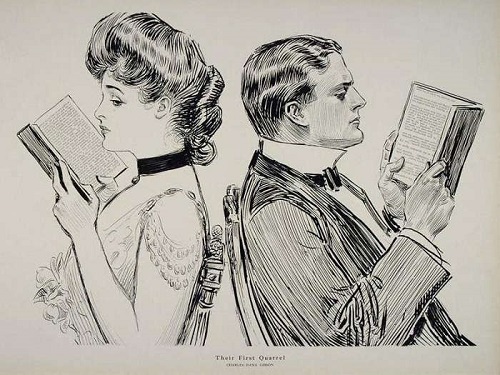FWP:
SETS == IDIOMS;
INEXPRESSIBILITY; PARALLELISM
MADNESS: {14,3}
SPEAKING: {14,4}
The commentators point out the wonderfully unforced parallelism of structure between the two lines, and the idiomatic fluency with which they've been put together. I'd only add that the kyuu;N la;Riye at the end of the first line, though it's grammatically a polite imperative, has a shrug-of-the-shoulders idiomatic effect like that of kyaa kahiye , in that it's a generalized expression, and it's not clear who might say it, or about whom. It can also be said about oneself. Thus the beloved might be saying to herself, 'He's a madman, why bother to quarrel with him?'; or of course she might say or think 'He's a madman', and he then might think, 'Why quarrel with her?'.
And does the lover avert his eyes, from any possibility of an answer (he's so sure he won't get one, that he's given up on it in advance)? Or does he avert his eyes from the particular answer she gives him, out of despairing self-preservation (since it's such a dire and discouraging one)? Or does he avert his eyes out of genuine indifference (since he's stubbornly determined to keep on loving her no matter what she says)? Or does he avert his eyes out of courtesy (since he's almost embarrassed for her sake at her hostile overreaction)? This ambiguity of tone is a classic Ghalibian effect.
It's the eyes he averts, rather than the ears, so perhaps
he already knows that he won't get an answer in words, but in some non-verbal
way-- gestures, shows of indifference, nasty looks? Thus the 'What can you
say?' at the end becomes all the more piquant, since it applies to an impossible
response to an unexpressed, unsaid answer to a hopeless question. It's thus
part of the semantic flow of the line, and also an expressive invocation of
the 'inexpressibility trope'. As Bekhud Dihlavi says, who else but Ghalib
can make all this look so easy?

Nazm:
By the 'assumption of madness' is meant that on hearing my question she says, 'You've gone mad'. And by 'averting the eyes' is meant, 'What reply would I give to her words?'. This theme is not the reason for the excellence of the verse; rather, the similarity of construction in both lines has created beauty in the verse. (225)
== Nazm page 225